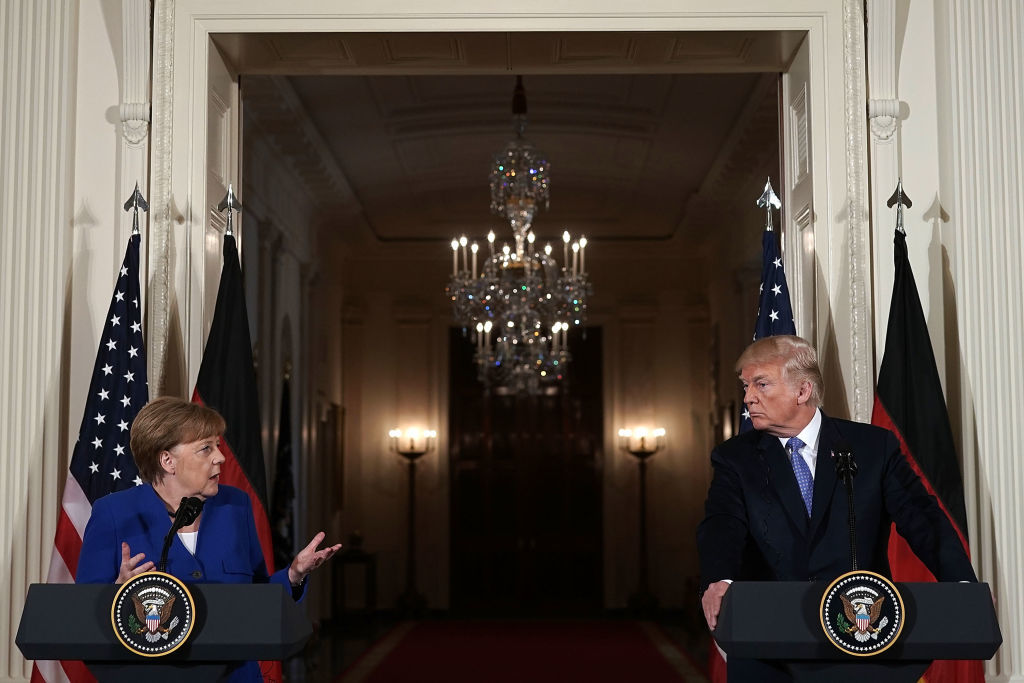Time was, a US President wouldn’t dream of criticising the government of one of its Nato allies in public – but that was a long, long time ago, before the Age of Trump. ‘The people of Germany are turning against their leadership as migration is rocking the already tenuous Berlin coalition,’ tweeted President Trump yesterday. ‘Crime in Germany is way up. Big mistake made all over Europe in allowing millions of people in who have so strongly and violently changed their culture. We don’t want what is happening with immigration in Europe to happen to us.’ Of course Trump is being terribly undiplomatic. No surprise there. That’s his thing – that’s what he does. But is he right?
When Trump says the German people are turning against their leadership, he’s bang on the money. The latest opinion polls make dismal reading for German Chancellor Angela Merkel and her ‘Grand Coalition’ of centre-right Christian Democrats and soft-left Social Democrats. For the first time since November, Merkel’s CDU/CSU alliance (her Christian Democratic Union and its Bavarian sister party, the Christian Social Union) fell below 30 per cent.
For Merkel’s coalition partners in the Social Democratic Party, the figures are even worse. In the last seven polls they’ve fallen below 20 per cent, only a few points ahead of Germany’s new anti-immigration party, Alternative für Deutschland. It’s always difficult to work out why voters vote a certain way (even if you ask them, you’re often none the wiser) but the divergent fortunes of the SPD and AfD would suggest Trump is correct: immigration is key.
As usual, Trump is right about the big picture, but wrong about the detail. Migration is rocking Merkel’s coalition, but the person who’s rocking it is the CSU leader Horst Seehofer, who wants to tighten Germany’s borders against immigration – something which ought to please Trump. Don’t underestimate Merkel’s flair for Realpolitk in this process. Seehofer’s CSU has always been more conservative than Merkel’s more centrist CDU. By giving Seehofer ownership of Germany’s new tougher immigration policy, Merkel can appease his supporters without alienating her more liberal base.
But while Trump may be onto something when it comes to immigration, he’s way off the mark about German crime. Contrary to popular misconception, since Merkel let a million migrants into Germany crime has actually fallen faster than at any time in the last 25 years: a 9.6 per cent fall in reported crimes last year – the biggest annual reduction in the Bundesrepublik since 1992.
Trump is talking nonsense when he says ‘Crime in Germany is way up.’ Yet amid these falling figures, the number of immigrant arrests is rising. As German news channel Deutsche Welle confirms, ‘Although the total number of incidents decreased in 2016, there was a clear increase in the number of crimes committed by refugees.’ This is mainly a matter of demographics, rather than ethnicity. All around the world, most crimes are committed by young men between 14 and 30. Over a third of German immigrants belong to this demographic group. What Trump should have tweeted (although it wouldn’t have been quite so catchy) is: ‘Crime is falling fast in Germany, but it’d be falling even faster if there weren’t so many migrants there.’
Trump talks about immigrants as one homogenous group, but Germany’s immigrant population is diverse. There’s a big difference between a doctor with a young family fleeing a war zone in the Middle East and an unskilled young man from a poor but peaceful country in North Africa, who is unlikely to gain asylum, and will end up outside the mainstream economy if he somehow manages to stay on in Germany. Syrian and Iraqi refugees commit fewer crimes than other immigrants, because they don’t want to endanger their asylum applications. The bigger danger is those immigrants without a valid reason to stay. If their asylum applications are rejected, they can’t apply for regular jobs and they aren’t eligible for language or integration courses. They often drift into the black economy, a short step away from crime.
What Trump doesn’t tweet about is that German immigration is falling rapidly – at an even more dramatic rate than German crime. In 2015, 890,000 migrants obtained asylum in Germany. That’s an awful lot of people, and the problems have been profound. However in 2016 it was 280,000, and last year it was 186,000. Out of a population of 82 million, that’s about 0.2 per cent.
Not long ago, Germany was worried about its shrinking, ageing population. In the short term, this sudden influx is a huge headache. In the longer term, who knows? Between the 1880s and the 1920s, two million Jews from Eastern Europe emigrated to the US. Most of them were poor. Many were unskilled. Few of them spoke the language. Yet a century later, how many Americans would dispute that they’ve been a huge economic and cultural asset?
Germany’s immigration problem is essentially a problem of prosperity. Like the United States, it’s an attractive destination for anyone seeking safety and security, and – above all – a better life. In 1885, a 16-year-old German came to America without work or prospects, and eventually made a fortune. He died 100 years ago, in Queens, New York, little knowing that his grandson would become President of the United States. His name was Friedrich Trump.


















